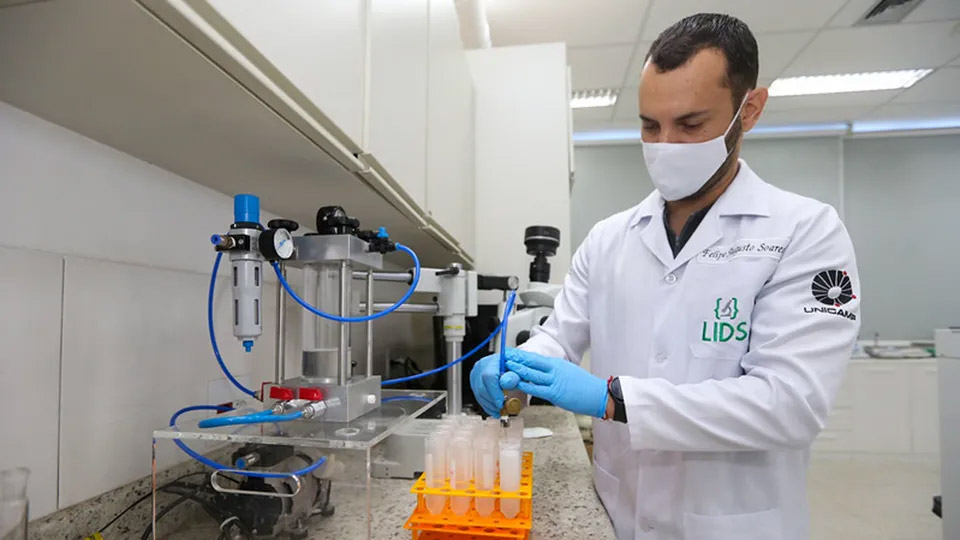Background
Internationally recognized for its excellence in teaching and research, the University of Campinas (Unicamp) in Brazil is a leading public institution based in Campinas, São Paulo. In 2003, Unicamp created Inova Unicamp Innovation Agency (Inova), which became the first technology transfer office to be established in a Brazilian university. Employing more than fifty people, Inova’s goal is to strengthen partnerships between Unicamp and companies, government agencies and other organizations to create teaching and research opportunities that will contribute to the economic and social development of Brazil.
Among Inova’s wide range of activities, many are related to the innovations developed at Unicamp by over 2,000 researchers throughout its 22 campus research centers. An important part of Inova’s mandate is explaining the importance of intellectual property (IP) protection to the academic community, preparing and filing Unicamp’s national and international patent applications, negotiating technology license agreements, and managing Unicamp’s incubator for start-up companies (InovaNIT).

Ferreira holding the materials used to produce Fentox
IP Management
Unicamp’s history with IP began in 1989, when it filed its first three patent applications with Brazil’s National Institute of Industrial Property (INPI). By 2010, Unicamp ranked second only to Petrobas, Brazil’s petrochemical company, in the number of patent applications filed with INPI. Inova considers IP to be an essential tool in the dissemination of knowledge and its transformation into social benefits, and also as a way to bring universities and commercial industries together in a way that will benefit both parties and foster technological advancement.
Interest in IP and cooperation between universities and companies have been steadily increasing in Brazil. Under strong international and domestic competitive pressure, many Brazilian companies have realized that forming and maintaining effective cutting-edge research activities are a costly and risky endeavor. Universities have vast research resources and are in many cases publicly funded, and this has garnered recognition in the business world that cooperative work with research institutions of universities such as Unicamp can help a company maintain market leadership. This is especially important when companies are looking for new ideas and technologies applicable to the development of new products, but may not have the necessary research and development (R&D) resources.
Because of this surge in interest of utilizing the research capabilities of universities, Inova has deemed it essential to secure IP rights (IPRs) for practically all of its innovations. This includes vaccines, pharmaceuticals, functional foods, telecommunication systems, information technology, and software programs, among others. Inova’s main IPRs are patents, as it files patent applications on behalf of Unicamp. Domestic applications are made with INPI and, when appropriate, international applications are filed through the Patent Cooperation Treaty (PCT) system. But Inova’s emphasis on IPRs does not stop with patents. It also registers trademarks and promotes licensees to do the same to build strong brands for commercialized products and processes and secures authorship IPRs for computer software.
When Inova was launched, the Faculty of Medical Sciences had four patents in the works and had never licensed out a single technology. By the end of 2008, it had filed 33 patent applications and signed four licensing agreements. The effect on PCT use was also remarkable. Before Inova, Unicamp had filed only one international patent application; by the end of 2008, it had filed 32.
Unicamp’s Institute of Chemistry has gone the furthest in implementing what it has learned about the importance of protecting IP, and by 2008 it had filed 214 patent applications. Professor Fernando Galembeck, the main inventor of two licensed out technologies, notes that the process of transferring technology to industry "has been extremely positive" for the research carried out at his laboratory, bringing in "additional and substantial resources" and helping to create "a climate of greater enthusiasm and more concern about the relevance of the results." He underscores that "if we don't have patents and we don't license them, inventions won't be transformed into real commercial products and processes. And if we only publish the results, we will have to pay tomorrow for the fruits of our own work".

PCT/BR2010/000056, PATENTSCOPE® search)
Patents and Trademarks
Twenty years after Unicamp’s first patent application, the university has filed nearly 600 patent applications at INPI, a vast majority of which can be attributed to the efforts of Inova. With the help of Inova, as of late 2010 Unicamp had filed 22 international applications. In 2008 alone, Inova filed 51 patent applications with INPI and 12 international applications, registered thirteen trademarks and secured authorship of ten computer programs.
Inova continues to file patent applications, and in February 2010 filed an international application for a new salmonella vaccine. Inova’s patents and trademarks cover a wide range of technological fields, with specific focus in health, industrial production, information technology, rural production and the exploitation of natural resources.
Licensing
A major focus of Inova’s activities is the licensing out of its developed technologies to companies and other public or private entities. The licensing scheme is made possible by the IPRs Inova has previously secured, and it is a way in which the innovations of Unicamp can be used to benefit society through the production and distribution of new and effective products. Inova is Unicamp’s sole body responsible for drafting, negotiating and formalizing licensing agreements.
Licensing focuses primarily on the technology transfer of brands, patents and computer software. Working closely with inventors and commercial industries, Inova’s technology transfer team ensures that technology is appropriately transferred and that licensing agreements are clearly established in line with the expectations, rights and obligations of all parties involved while ensuring that the technology is easily accessible to the population.
Since Inova has started management of Unicamp’s IP, the following products based on technologies licensed out by the university have reached the Brazilian market:
A test to identify the main cause of genetic deafness in newborn babies. This award-winning technology, developed by the Center of Molecular Biology and Genetic Engineering, was licensed in 2004 to the diagnostics company DLE, which commercialized it in 2005.
A phytotherapeutic medicine, produced from a substance found in soybeans, to treat menopausal symptoms. The Faculty of Food Engineering filed two patent applications for this technology which it licensed to Steviafarma in 2004. The medicine was launched in 2007 following the approval of the National Health Surveillance Agency (Anvisa).
A polymer-clay nanocomposite that can be used as raw material for a wide range of products. Marketed as Imbrik, this technology was invented at the Institute of Chemistry, and its production process licensed to Orbys Tecnologia de Nanocompositos Poliméricos in 2005. Two years later, another company, LCM Bolas, used it for producing Nanoball, a more durable and resistant tennis ball.
A reagent for in-situ and ex-situ destruction of environmental contaminants. Developed at the Institute of Chemistry, the reagent was licensed to Contech Produtos Biodegradáveis in 2007 and is marketed under the brand name Fentox.
A fecal test for parasitological diagnosis. Immunoassay signed an agreement with Unicamp in 2008 for the commercialization of the TF-Test (Three Fecal Test), developed at the Institute of Biology. The company is producing and distributing the test to several hospitals and clinical analysis laboratories.
Because Unicamp focuses on R&D and licensing out its IP, the university generally does not deal with the commercialization of products. For the five products that were on the market as of 2010, all were commercialized by the licensee(s).

Institute of Biology
Research and Development and Partnerships
Because Inova is primarily focused on technology transfer, fostering innovative R&D, assisting Unicamp’s researchers in the licensing of innovations and building strong partnerships between companies and organizations in the public and private sectors is of significant importance. Unicamp’s research and the partnerships developed by Inova go hand in hand.
One such example was a technology invented by Professor Licio Velloso of the Faculty of Medical Sciences. Professor Velloso developed a synthetic insulin-based substance for treating diabetes mellitus. Recognizing the importance and positive social implication of such a discovery, Inova formed a partnership with Aché Laboratórios (Aché) to commercialize the new drug, and secured two million Brazilian reais (R$) from Aché for its initial development, which Unicamp and Aché carried out through their partnership.
Injection of funds such as these serve a twofold purpose: first, it allows Unicamp’s researchers to continue innovating, and second, it gives Inova new technologies to use to develop new partnerships. Unicamp is regularly involved with many similar collaborative research projects, and in 2008 it finalized over thirty with various Brazilian companies and institutions. These collaborations are expected to yield approximately R$ 8 million in investment in Unicamp.
Business Results
The creation of Inova has brought many tangible benefits to Unicamp. Licensing out technologies brought in much needed revenue, and by the end of 2008 the five technologies that were commercialized in Brazil earned the university some R$ 900,000 in royalties. The university’s efforts into technology transfer caught the attention of the Brazilian government, and in 2008 it received state funding for a new Research and Innovation Hub at the main campus in Campinas.
Beyond financial gains, Inova has revitalized many of Unicamp’s research facilities. Prior to Inova, many research centers would discover new technologies, but would have little ability to translate them into real economic and social benefits. Inova’s licensing and technology transfer scheme changed all that, and research centers are seeing their technologies commercialized with real social benefits. Inova’s success has also allowed the university to help other public science and technology institutions in Brazil establish technology transfer systems through its “InovaNIT” project. From July 2007 to December 2008, the project assisted 186 institutions and had 539 people participate in 24 courses it offered. InovaNIT has been a big success, and it continues to stimulate technological entrepreneurship and the development of a local innovative environment.
Technology Transfer for Innovation and Development
As Unicamp President Professor Fernando Costa, explains, "The creation of Inova showed that technological innovation is a key element of development in Brazil. Although companies should always remain the main innovators in a country, Unicamp is aware of the major role that universities can play in less developed national innovation systems." Unicamp has not lost sight of its fundamental mission – to provide high-quality teaching, conduct first-class research and extend knowledge-based services and other resources to society at large – but it has been able to complement it by creating a significant IP asset portfolio, which has made significant strides in the social and economic development of Brazil.



